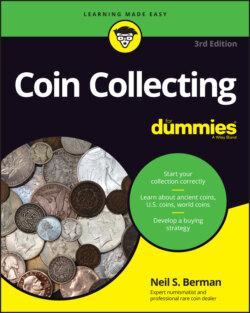Читать книгу Coin Collecting For Dummies - Neil S. Berman - Страница 73
Deciding between a home safe and a safe-deposit box
ОглавлениеShould you store your coins at home or in a safe-deposit box in a bank? The answer depends on how comfortable you feel about keeping your coins at home, the value of your collection, and the importance of having your coins close by. Some collectors love to view with their coins every chance they get. You may have a collection that’s rapidly growing and changing, thereby requiring continuous access to the coins. Other collectors are perfectly happy making an occasional trip to the bank to view their numismatic treasures. Ultimately, you must determine the amount of risk involved in keeping your coins at home, whether you can protect against those risks, and whether you can afford the loss in a worst-case scenario.
Home safes come in a variety of sizes and types:
Floor safes: Floor safes are embedded in the concrete floor of your home and are easiest to hide. But they offer limited space, and you may get tired of pulling the rug back and getting on your hands and knees just to open the safe.
Wall safes: Unless your wall safe is embedded in concrete, don’t bother getting one. Thieves can use a crowbar to pop them out of the wall and carry them away.
Regular safes: Safes can protect your coins against fire, burglary, or both, and with regular safes, you have many more options concerning size and weight. The main thing safes buy you is time — something that burglars don’t have a lot of. I recommend buying a safe that weighs more than 1,000 pounds; otherwise, why bother?
Fire safes: These types of safes are more for protection against fire than they are for protection against burglars. Choose this type if you live in an area of high risk for fires and you feel relatively safe from theft. I’ve seen some neat coin collections reduced to melted lumps of metal because they weren’t protected properly.
Just as there are different choices in safes, there are multiple options in safe-deposit boxes. Things to consider are size, bank hours, access restrictions, terms of the agreement, the climate inside the vault, and insurance. (You can read more about insurance in “Insuring Your Investment” later in this chapter.)
